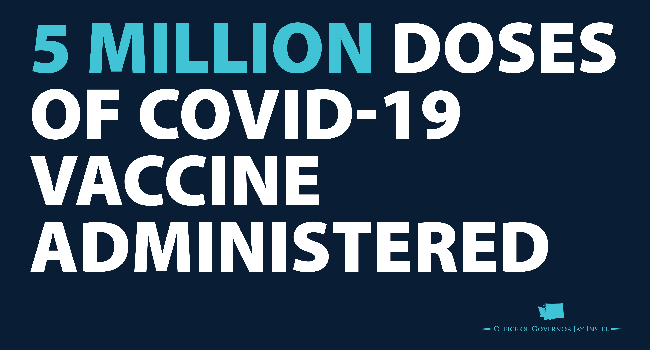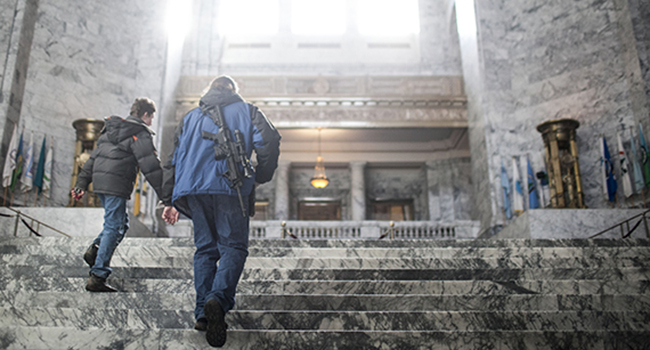Friends:
The 2021 legislative session is now history – or rather, truly historic. It was the first ever remote session, but even with all the technological and other communication challenges, I am beyond impressed by how much lawmakers were able to accomplish even when we weren’t sure a remote session could be done in the first place.
I’m looking forward to sharing with you all the landmark policies in greater detail in the coming months. Keep an eye out for additional e-newsletters from me that will have more information about our 2021 session accomplishments.
But for now, here’s a quick update on the Legislature’s work as we addressed an unprecedented public health crisis, a K-shaped economic recession, remote learning, rising gun violence, police accountability, and our state budget.
COVID-19 Update
 Everyone over the age of 16 is now eligible for vaccination. You can see information on who is currently eligible as well as how to schedule an appointment here.
Everyone over the age of 16 is now eligible for vaccination. You can see information on who is currently eligible as well as how to schedule an appointment here.
In effort to streamline the process, the Phase Finder tool is no longer needed to verify eligibility. Those who are eligible may use the Vaccine Locator to find available appointments now.
You can pre-register to be notified of appointments at the Seattle sites, including Lumen Field, here. If you need assistance making an appointment, please call the King County Call Center at 206-477-3977 between 8 a.m. and 7 p.m. (interpreters will be available).
According to a recent survey from the U.S. Census Bureau, at 73%, the Seattle metro area has the highest “willingness to be vaccinated” in the country. Already, over 88% of King County residents 65 years of age and older have received at least one dose! While there are still inequities occurring in vaccine delivery, our county and state are improving access by making more interpreters available, providing transportation to vaccination sites, and partnering with trusted community organizations.
As we move forward, it is still critical to mask up and socially distance. The virus is rapidly changing and cases are still consistently present in King County.
It was clear from the start of the pandemic that the public health crisis was going to have a negative effect on our economy. So lawmakers went to work on policy changes and investments to help small businesses weather the storm. Within weeks of the opening day of session, the Legislature approved $1.7 billion in unemployment premium tax relief for businesses and increases to unemployment benefits for workers. And shortly after another $2.2 billion for additional economic stimulus for small businesses, schools, health care organizations, food assistance, and childcare.
The Legislature also expanded access for small businesses to get a line of credit to recover from the pandemic and additional funds will go to boost businesses that rely on robust tourist activity.
Elementary school students have been back learning in-person already and in the coming weeks more secondary school students will be as well. The Bellevue School District (BSD) welcomed back students across all grade levels and will continue to offer hybrid and 100% remote learning options. The Lake Washington School District has transitioned to expanded in-person learning options. For more information, please visit their website.
Also, you may have heard about a data breach of a company that was working with the State Auditor’s office. Unfortunately, the personal information of more than a million Washington residents may have been stolen. This is a deeply disturbing breach of public trust and lawmakers are working to prevent this from happening again.
In the meantime, it is important that we all take necessary steps to protect our personal information as much as possible. The State Auditor is making free credit monitoring available to the people of Washington as part of their response to the data breach. I would encourage you to visit the State Auditor’s website to learn more about this situation and sign up for the free credit monitoring service if you are eligible.
Firearms Safety

America has a gun violence problem. We’ve seen it in the news nearly every day. More than 38,000 people die of gun violence in this country every year. This is a public health crisis.
For far too long, elected leaders across our country see these tragedies in the news, share their thoughts and prayers to victims and communities, and do nothing legislatively. Enough is enough.
Washington state enacted a number of gun safety measures in recent years including bans on bump stocks and ghost guns, allowing for the temporary removal of firearms from those who are at extreme risk of hurting themselves or others, and revoking concealed pistol licenses from those with stalking or sexual assault protection orders.
While these are all important policies to help keep guns out of the hands of dangerous people, there’s still work to do. This year, I sponsored SB 5038 to prohibit open carry firearms at permitted demonstrations and the state Capitol. This reasonable restriction is long overdue as there’s no reason for someone to open carry a firearm while others are expressing their First Amendment rights. The only reason is to intimidate and evoke fear in others. The Senate approved a few changes made by the House and the bill is now on Governor Inslee’s desk awaiting signature.
I will also be back next year with my bill to ban assault weapons. These are weapons of war and have no place in our communities, especially since they are clearly the weapon of choice for mass shooters.
And I am overjoyed that we now have an Administration that has made a commitment to solving this problem. In case you missed it, President Biden announced a new path forward on several firearm safety measures including a call for a new assault weapons ban.
A Budget that Puts People First

For much of last year, lawmakers were bracing for a major decrease in state revenues due to the public health crisis and economic slowdown. However, we received an updated economic forecast that showed our state’s economy has mostly recovered from the downturn.
Our rebounded economy, a healthy state rainy day fund, and billions in relief from President Biden’s American Rescue Plan means lawmakers can continue making key investments in state services that will help families and small businesses get back on their feet.
I’ll have more details to share in the coming weeks. But I’m especially pleased with the significant investments in housing in our final operating budget – more than $1.6 billion to help families stay in their homes. With more than 200,000 Washington households that are currently behind in rent, additional resources for tenants and landlords are needed to ensure people can stay in their homes. Especially during a pandemic.
Thanks to President Biden’s American Rescue Plan and our state’s rainy day fund, our budget has:
- More than $700 million for emergency rental and utility assistance for low-income households who cannot afford rent due to the COVID-19 pandemic.
- $100 million for low-income home energy assistance.
- $187 million for homeowner assistance to prevent foreclosure for individuals under 100% area median income.
We also have additional funding to help tenants navigate the legal process when facing an eviction and funding to help landlords cover the costs for certain losses of rental revenue.
The state budget also has much needed funding for learning loss-specific programs to help students catch up from lost education opportunities due to the public health crisis. And thanks to the American Rescue Plan, we allocate nearly $400 million for additional support for childcare providers.
I’ll have more to share on this topic in the coming weeks.
Capital Gains Excise Tax
 There has been some misinformation surrounding SB 5096, the capital gains excise tax bill, that I would like to clear up. The vast majority of Washingtonians will not pay a cent – only the wealthiest residents, 0.23% to be exact, will be paying this tax as assessments are only made on certain profits in excess of $250,000. The bill includes a number of exemptions including the sale of homes, most small businesses, retirement accounts, and any profits from stock and bond sales under $250,000.
There has been some misinformation surrounding SB 5096, the capital gains excise tax bill, that I would like to clear up. The vast majority of Washingtonians will not pay a cent – only the wealthiest residents, 0.23% to be exact, will be paying this tax as assessments are only made on certain profits in excess of $250,000. The bill includes a number of exemptions including the sale of homes, most small businesses, retirement accounts, and any profits from stock and bond sales under $250,000.
My colleague Senator Nguyen created a video explanation of this bill that you can view here.
Our tax system in Washington is broken, and the most upside down in the nation. Working families are paying 17% of their income in taxes, while the wealthiest pay only 3%. This bill addresses that inequity and aims to rebalance our tax code. Capital gains are taxed in 41 other states including Idaho, Oregon, California and Montana.
The revenue from this will help fund the Education Legacy Account, the Working Families Tax Credit (HB 1297) as well as childcare and early learning programs (the Fair Start for Kids Act, SB 5237).
Police Reform & Accountability

Trust between our police and the people they serve has been broken in many communities across the state because lives continue to be shattered by officers who abuse their power. High profile stories of abuse of power in Washington state and across the nation have shown law enforcement reform is long overdue.
This issue was a top priority for Senate and House Democrats, and I’m pleased to report we’re making good progress. Below are just a few of the police reform bills we passed into law this session.
- Officer Credibility (HB 1088): Sheds light on officers who are not credible witnesses because of their previous conduct.
- Duty to Intervene (SB 5066): Establishes clear standards for police officers to intervene when fellow officers use force unjustly and to report any wrongdoing by fellow officers.
- Police Tactics (HB 1054): Bans the use of chokeholds, neck restraints, unleashed police dogs, no-knock warrants, military equipment, and intentionally concealing police badges.
- Improved State Oversight (SB 5051): Timely and effective enforcement of state standards for law enforcement officers.
- Independent Investigations (HB 1267): Mandates the independent investigation of deadly uses of force, custodial deaths, and other officer-involved incidents.
- Data Collection (SB 5259): Establishes comprehensive statewide reporting and publication for use-of-force incidents involving law enforcement.
I had a bill, SB 5089, that would have made the applicant pool much more diverse to better reflect the communities law enforcement serves. The bill would have raised the age to become an officer from 20.5 to 23 years, required two years of post-high school education or work equivalent, and required a two-year probationary period to align with the brain development science. While the bill did not make it out of the Senate this year, I will continue working on it along with the law enforcement candidate recruitment process over the interim. I plan on reintroducing the bill again in 2022.
Thank you again for your interest in the work lawmakers are doing on your behalf in the state Legislature. You can learn more about the bills I’m working on over at my website here and also on my Facebook page.
Please keep in touch and let me know how I’m doing. Click here for information on how to connect with my office.

Patty Kuderer
State Senator
48th Legislative District




